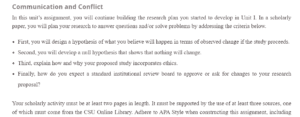Communication and Conflict
Hypothesis
Creating an understanding of the importance of communication will lead to improved conflict resolution and performance among SMEs.
Suppose this study is carried out; it should provide critical information to small-scale business owners. As highlighted in the background information, most SMEs fail to understand the importance of communication in conflict resolution. This situation results from a lack of information or knowledge regarding how communication can be used to benefit these entities (Adejimola, 2009). Conducting the study is critical in changing the current status quo and ensuring that such knowledge is availed to SME managers. Thus, such verified information should reduce conflicts in the organizations, improve communication, provide better strategies for conflict resolution through communication, and promote information and knowledge sharing. These benefits should translate into positive/desired economic results, better socialization at the workplace, communication frameworks, and the formation of organizational cultures that enable goal achievement. Overall, conflict in SMEs will be more beneficial than harmful, leading to better performance of such entities.
Null Hypothesis
Understanding communication dynamics will not improve conflict resolution in SMEs
Research Ethics
Incorporation of ethics while conducting research is an important step in developing and maintaining validity and credibility. Interactions with the business community may result in psychological, financial, or social harm (Ethical Considerations, 2004). The increased cases of litigations against researchers highlight the need to conduct ethical studies. Carrying out such a study ensures that the researcher is protected from external criticism and legal battles as well. The need to incorporate ethics in the study also arises from the need to request access to critical company information that pertains to conflict resolution, information sharing, and knowledge transfer. For organizations to allow researchers to access such information, they must be sure that the information they provide will be used ethically for specific purposes. Such assurance is obtained when the researchers seek backing from their educational institutions (Polonsky, 1998). To obtain institutional support, we have to commit to using all data and information ethically and responsibly. The data obtained during the study should be confidential to avoid confrontation with the respondents. Similarly, the need to divulge further information requires permission from the participants. Thus, this study will have to compel individuals or company holders to take part in the study. They will be expected to sign documents illustrating their willingness to participate.
Changes in research
I expect the standard institutional review board to request changes in the study through meetings. In these forums, the boars will explain their requests and have researchers elaborate on the study’s current state. It will be possible to understand both parties’ perspectives. Other means that can be used to request immediate or urgent changes include emails and conference calls. The conference calls are ideal for urgent changes impacting the results significantly or changing the study’s direction. The conference calls allow individuals to explain their perspectives and listen to the board members. The email addresses can be used to follow up on the ongoing changes and decisions regarding the study. Thus, communication modes are critical in choosing the best strategy for the introduction of changes.
References
Adejimola, A. S. (2009). Language and communication in conflict resolution. Journal of Law and Conflict Resolution, 1(1), 001-009.
Anand, A., & Walsh, I. (2020). The four stages of the knowledge-sharing process in SMEs. International Journal of Enterprenuership and Innovation Management, 24(6), 465-481.
Ethical Considerations. (2004). 53. Retrieved from https://www.sagepub.com/sites/default/files/upm-binaries/4999_Polonski_Chapter_5.pdf
Polonsky, M. J. (1998). Incorporating Ethics into Business Students’ Research Projects: A Process Approach. Journal of Business Ethics, 17, 1227-1241.
Teherani, A., & Martimianakis, T. (2015). Choosing a Qualitative Research Approach. Journal of Graduate Medical Education, 7(4), 669-670.
ORDER A PLAGIARISM-FREE PAPER HERE
We’ll write everything from scratch
Question
Communication and Conflict
In this unit’s assignment, you will continue building the research plan you started to develop in Unit I. In a scholarly paper, you will plan your research to answer questions and/or solve problems by addressing the criteria below.

Communication and Conflict
- First, you will design a hypothesis of what you believe will happen in terms of observed change if the study proceeds.
- Second, you will develop a null hypothesis that shows that nothing will change.
- Third, explain how and why your proposed study incorporates ethics.
- Finally, how do you expect a standard institutional review board to approve or ask for changes to your research proposal?
Your scholarly activity must be at least two pages in length. It must be supported by the use of at least three sources, one of which must come from the CSU Online Library. Adhere to APA Style when constructing this assignment, including in-text citations and references for all sources that are used. Please note that no abstract is needed

